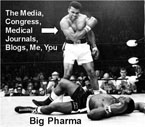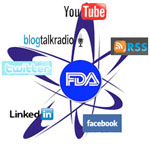Vol. 8, Issue No. 3: MARCH 2009 – EXECUTIVE SUMMARYSyndication is da Bomb! Upfront Commentary
![]() You’ve seen this RSS icon. RSS stands for “real simple syndication,” which is a technology used to publish frequently updated works-such as blog entries, Twitter “tweets,” news headlines, audio, and video-in a standardized format.
You’ve seen this RSS icon. RSS stands for “real simple syndication,” which is a technology used to publish frequently updated works-such as blog entries, Twitter “tweets,” news headlines, audio, and video-in a standardized format.
Many publishers, including Pharma Marketing News, and even the FDA syndicate content via RSS feeds. In this UpFront piece, John Mack, Editor of Pharma Marketing News, reviews how PMN uses RSS feeds to provide content to our readers from a wide variety of sources including the FDA, PhRMA, major news media, blogs, trade publications, etc.
Read this entire OpEd piece by John Mack here:
www.news.pharma-mkting.com/PMNews_83_UpFront.pdf Pharma’s Bad Rep or Bad Rap Whatever! The Drug Industry Must Earn Back the Public’s Trust
 Over the years, Harris Interactive has polled Americans about their attitudes toward corporate America. The pharmaceutical industry has consistently received low scores; in 2007, for example, only 26 percent of Americans viewed the industry favorably. Among the 11 industry sectors examined, only tobacco companies had a measurably lower rating.
Over the years, Harris Interactive has polled Americans about their attitudes toward corporate America. The pharmaceutical industry has consistently received low scores; in 2007, for example, only 26 percent of Americans viewed the industry favorably. Among the 11 industry sectors examined, only tobacco companies had a measurably lower rating.
Who and/or what is to blame for pharma’s bad reputation? And what should the industry do to win back the public’s trust?
The “How to Earn Back the Public’s Trust” survey hosted by Pharma Marketing News between February 4, 2009 and March 14, 2009 was designed to answer these questions.
This article summarizes the results of that survey, including selected comments from respondents and other commentators.
Topic headings include:
- Royal Pain from Physicians
- Is Pharma’s Bad Reputation Deserved?
- What’s Causing the Bad Reputation?
- Industry and Its Stakeholders Disagree
- Suppression of Negative Clinical Data
- The Media’s Role
- Is DTC Advertising the Culprit or Just the Poster Boy?
- What’s the Solution?
- Transparency Is Key
- Improve Relations with HCPs
- The Industry Needs to Re-invent Itself
- Don’t Look Back, Look Forward
Read this article now. It’s FREE…
Will Healthcare be Rationed or Rational? A Case for Supporting Comparative Effectiveness Research
 “We ration care in the US today using one of the most capricious andinequitable means possible–ability to pay,” says Kim Slocum, formerDirector, Strategic Planning & Business Development at AstraZeneca.”As cost shifting to consumers has accelerated over the past decade,we’ve seen the effects of this as year-on-year sales growth forprescription products has dropped on more or less a straight line since2000.”
“We ration care in the US today using one of the most capricious andinequitable means possible–ability to pay,” says Kim Slocum, formerDirector, Strategic Planning & Business Development at AstraZeneca.”As cost shifting to consumers has accelerated over the past decade,we’ve seen the effects of this as year-on-year sales growth forprescription products has dropped on more or less a straight line since2000.”
Unless something changes, Slocum envisions direconsequences for the drug industry: “Extend the trend out just a bitfurther and you’re faced with a world in which sixty or seventy millionpeople are completely uninsured with many of the remainder living withvery skimpy coverage. Generic utilization rates in this situationprobably exceed 80% and perhaps 30%-40% of all prescriptions gounfilled.” This describes a future scenario Slocum calls “ConsumerChaos.”
In this article, Slocum describes several alternativescenarios and makes a case for the industry to support ComparativeEffectiveness Research or CER.
Topic headings include:
- All Health Systems Ration Care
- Pharma 2020
- Evidence is, or Will be King
- The Current Path is Untenable
- Possible Future Scenarios
- Badly Done CER
- Best Course of Action
Read this article now. It’s FREE…
FDA’s Use of Social Media Peanuts Today, Drugs Tomorrow!
 Pharmaceutical marketers were surprised to learn how extensively FDAused social media and Web 2.0 in the new year. The recall of 3,400contaminated peanut products in 2009 was described at an eMarketingconference in Princeton, NJ. Pharma marketers heard that blogs, socialmedia, YouTube and Twitter were new tactics embraced by the regulatoryagency, at least in its communication with the public on an importantfood safety issue. FDA, along with CDC and HHS, was pulled further intosocial networking by growing public concern over the rapid growth anddiversity of the peanut-product recall list.
Pharmaceutical marketers were surprised to learn how extensively FDAused social media and Web 2.0 in the new year. The recall of 3,400contaminated peanut products in 2009 was described at an eMarketingconference in Princeton, NJ. Pharma marketers heard that blogs, socialmedia, YouTube and Twitter were new tactics embraced by the regulatoryagency, at least in its communication with the public on an importantfood safety issue. FDA, along with CDC and HHS, was pulled further intosocial networking by growing public concern over the rapid growth anddiversity of the peanut-product recall list.
In the future, willthe FDA also be pulled into social media by a major Rx drug recall? What can the drug industry learn from the FDA’s use ofsocial media and will FDA’s example help guide the industry toward bestpractices in this area?
This article describes FDA’s socialnetworking initiatives in context of the above questions.
Topic headings include:
- A Coordinated Campaign
- FDA and Twitter
- Improved Search Capability
- FDA’s Social Media Peanut Recall Resources for Consumers
- FDA YouTube Peanut Recall Videos
- What’s the Takeaway for Pharma?
- FDA Widgets: How About One for Adverse Event Reporting?
- Demise of the One-Click Rule?
- FDA and YouTube: Do as We Say, Not as We Do
- DDMAC Gets Bully Pulpit Again, But Strikes Out
Read this article now. It’s FREE…
New Privacy Rules in Economic Stimulus Law Will They Restrict Certain Pharmaceutical Marketing Practices?
 Beefed-up patient privacy protections in the recently enacted economicstimulus package are expected to place significant new restrictions onhow some players in the pharmaceutical supply chain, including chaindrugstores and PBMs, gather and distribute prescribing information topharmaceutical firms for what critics claim is the purpose of marketingdrugs.
Beefed-up patient privacy protections in the recently enacted economicstimulus package are expected to place significant new restrictions onhow some players in the pharmaceutical supply chain, including chaindrugstores and PBMs, gather and distribute prescribing information topharmaceutical firms for what critics claim is the purpose of marketingdrugs.
This article reviews the medical privacy restrictionsincluded in the American Recovery and Reinvestment Act, which PresidentObama signed into law on Feb. 17, 2009, and discusses the impact theserestrictions might have on pharmaceutical marketing.
Topic headings include:
- Limits Placed on HIPAA Exclusions
- Could Curtail Marketing
- Critics Warn That Rx Data Are Still Accessible
- Ensuring That Privacy Doesn’t Hamper HIT
Read this article now. It’s FREE…



![6 Digital Tools at the Center of Healthcare Digitalization [INFOGRAPHIC]](http://ec2-54-175-84-28.compute-1.amazonaws.com/pharma-mkting.com/wp-content/uploads/2021/04/6DigitalTools_600px-218x150.jpg)




![6 Digital Tools at the Center of Healthcare Digitalization [INFOGRAPHIC]](http://ec2-54-175-84-28.compute-1.amazonaws.com/pharma-mkting.com/wp-content/uploads/2021/04/6DigitalTools_600px-100x70.jpg)




